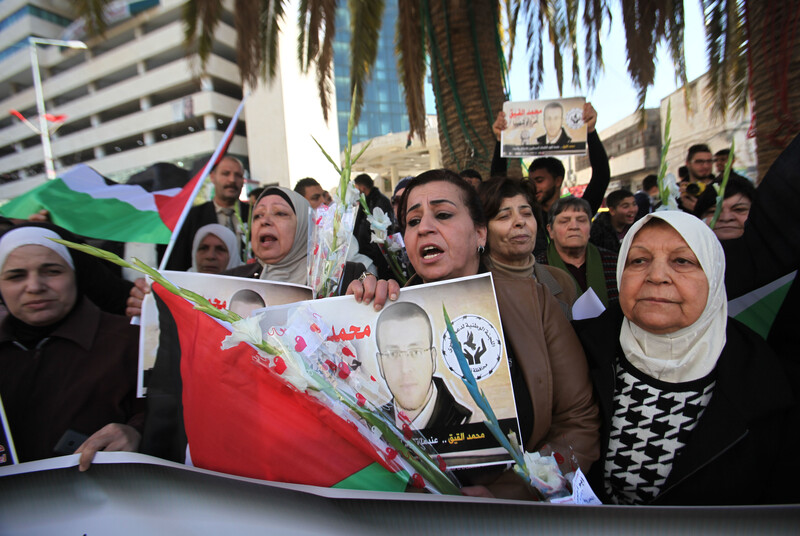Rights and Accountability 4 February 2016

Palestinians in the occupied West Bank city of Nablus take part in a protest on 3 February in solidarity with journalist Muhammad al-Qiq who is on the brink of death after more than 70 days on hunger strike in Israeli custody.
APA imagesAfter 71 days on hunger strike, Muhammad al-Qiq is on the verge of death, according to doctors at the Israeli hospital where the Palestinian journalist is being detained.
Al-Qiq, a 33-year-old father of two, is a journalist with the Saudi News Agency Al-Majd.
During a meeting on Wednesday, the ethics committee at HaEmek hospital in the northern city of Afula concluded that al-Qiq could die at any moment and his organs are at risk of failure, the official Palestinian news agency Wafa reported.
Meanwhile, Robert Piper, the United Nations coordinator for humanitarian assistance and development aid, is the latest international figure to call upon Israel to charge or release al-Qiq, along with the hundreds of other Palestinians held without charge or trial.
“I am deeply concerned about the continued practice of administrative detention in Israeli jails and detention centers,” Piper said.
“In particular, I am alarmed by the rapidly deteriorating health of Palestinian administrative detainee, Mohammed Al-Qiq, who is on hunger strike in protest against the arbitrary nature of his detention and ill-treatment.”
Piper also demanded that all allegations of ill-treatment be independently investigated.
“Free or dead”
The hospital ethics committee, made up of nine doctors, has said that it will not force feed al-Qiq.
“All treatment is done subject to the laws of the state and taking medical ethics into account,” the committee stated.
Though al-Qiq can no longer speak and has lost significant hearing, he is still conscious and refuses any medical treatment.
Israel’s law on patient rights and several international declarations require informed consent before a person is given any medical treatment.
The World Medical Association’s Tokyo Declaration, for instance, forbids physicians from taking part in torture and other cruel, inhuman or degrading procedures against detained persons, including providing nourishment against the person’s will.
Last month, the hospital forcibly treated al-Qiq for four straight days.
Prison guards at the hospital tied him to his bed and put an intravenous line in his arm to administer salts and minerals against his will.
Last summer, Israel’s parliament legalized the force-feeding of hunger strikers, but the law has yet to be implemented.
In an interview with Al Jazeera English, al-Qiq’s wife, Fayha Shalash, said that her husband had signed a paper refusing any medical treatment, even if he loses consciousness.
“His decision is very clear: either free or dead, not in between,” Shalash said.
No charges
Al-Qiq was arrested 21 November and placed under six months of administrative detention after three weeks of interrogation.
This is a practice in which Israel imprisons people, almost always Palestinians, without charge or trial and it is renewable indefinitely.
There are currently 660 Palestinians in administrative detention.
Last week, Israel’s high court decided to keep al-Qiq in custody but ordered the hospital to deliver daily reports on his condition
The high court is scheduled to review al-Qiq’s detention Thursday afternoon.
At last week’s hearing, presiding judge Elyakim Rubinstein listed the Israeli military prosecutors’ suspicions against al-Qiq: “Involvement in recent military activity, in the operations of Kutla Islamiya [the Hamas student movement] in Birzeit University, and military contact with operatives in the Gaza Strip.”
Shalash told Al Jazeera that during al-Qiq’s interrogation soldiers pressured her husband to confess to media incitement. She said that it was only after he refused to confess that they began accusing him of involvement with Hamas, which Israel considers illegal.
Israel has arrested and charged al-Qiq three times before and the Palestinian Authority has detained him twice for month-long periods.
“He was given charges and served his time in prison. But this time, he feels this is an unlawful arrest. There are no charges against him, no real reason for his detention,” Shalash said.
Jordanian prisoners on strike
Separately, the Israel Prison Service has announced that it will transfer Jordanian national Akram Zuhra to Jordanian authorities, after Zuhra waged a hunger strike demanding he be released after completing his 16-year sentence.
Zuhra launched his hunger strike on 23 January.
Meanwhile, Israeli authorities are refusing to transfer hunger-striking prisoner Abdullah Abu Jaber into Jordanian custody.
Abu Jaber, also a Jordanian national, was sentenced to 20 years in prison in 2000 for allegedly detonating a bomb on a bus in Tel Aviv.
He launched his hunger strike on 22 November, suspending it for three days in December, to demand he be allowed to complete his sentence in Jordan.
He is now also demanding family visits and contact with the Jordanian ambassador.






Comments
Hunger striker Al Qiq held without charges
Permalink Janet Gillmar replied on
This is such a tragic story, and there have been so many other Palestinians held indefinitely in "administrative detention". I weep for the young life caught so short without good reason and for his wife and children and other family members and friends. How can his family be helped? How can his wife live and their children grow up without their trust in the world betrayed.